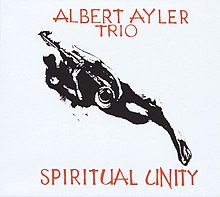Spiritual Unity
Spiritual Unity is a studio album by American jazz saxophonist Albert Ayler, with bassist Gary Peacock and percussionist Sunny Murray. It was recorded for the ESP-Disk label and was a key free jazz recording which brought Ayler to international attention as it was so "shockingly different".[1]
| Spiritual Unity | ||||
|---|---|---|---|---|
 | ||||
| Studio album by Albert Ayler Trio | ||||
| Released | 1965 | |||
| Recorded | July 10, 1964 | |||
| Studio | New York City, New York, U.S. | |||
| Genre | Free jazz | |||
| Length | 29:13 | |||
| Label | ESP-Disk | |||
| Producer | Bernard Stollman | |||
| Albert Ayler Trio chronology | ||||
| ||||
Recording
The single recording session that resulted in Spiritual Unity was ESP's first. It was on July 10, 1964, in the Variety Arts Recording Studio, off of Times Square in New York City. The session began some time after one in the afternoon. "At one point," according to the record label, "the engineer fled the control room for a few minutes, but returned in time to change the tape for the next selection". Although label owner, Bernard Stollman, remembered asking for a stereo recording, the session, well mixed and miked, was in mono. The musicians were paid and signed recording agreements after the session, in a nearby cafe.[2]
Critical reception
| Review scores | |
|---|---|
| Source | Rating |
| AllMusic | |
| Penguin Guide to Jazz | 👑[4] |
| Pitchfork | 9.3/10[5] |
| The Rolling Stone Jazz Record Guide | |
The critic Ekkehard Jost wrote that "Ayler's negation of fixed pitches finds a counterpart in Peacock's and Murray's negation of the beat. In no group of this time is so little heard of a steady beat [...] The absolute rhythmic freedom frequently leads to action on three independent rhythmic planes."[7] Maintaining these qualities required deep group interaction. Ayler himself said of the record, "We weren't playing, we were listening to each other".[1] The Penguin Guide to Jazz selected this album as part of its suggested "Core Collection" and awarded it a "crown".[8]
In 2013, Spin included it on the "Top 100 Alternative Albums of the 1960s" list.[9] In 2017, Pitchfork placed it at number 30 on the "200 Best Albums of the 1960s" list.[10]
Track listing
All tracks are written by Albert Ayler.
| No. | Title | Length |
|---|---|---|
| 1. | "Ghosts: First Variation" | 5:12 |
| 2. | "The Wizard" | 7:20 |
| 3. | "Spirits" | 6:46 |
| 4. | "Ghosts: Second Variation" | 10:01 |
| Total length: | 29:13 | |
| No. | Title | Length |
|---|---|---|
| 5. | "Vibrations" | 7:49 |
| Total length: | 37:17 | |
Personnel
Credits adapted from liner notes.
- Albert Ayler – tenor saxophone
- Gary Peacock – double bass
- Sunny Murray – percussion
References
- Wilmer, Valerie (1977). As Serious As Your Life: The Story of the New Jazz. London: Quartet. p. 105. ISBN 0-7043-3164-0.
- "Spiritual Unity". ESP-Disk. Retrieved April 12, 2013.
- Huey, Steve. "Spiritual Unity - Albert Ayler". AllMusic. Retrieved April 21, 2020.
- "Penguin Guide to Jazz: 4-Star Records in 8th Edition". Tom Hull. Retrieved 9 July 2020.
- Richardson, Mark (March 14, 2005). "Albert Ayler: Spiritual Unity / Live on the Riviera". Pitchfork. Retrieved April 21, 2020.
- Swenson, J., ed. (1985). The Rolling Stone Jazz Record Guide. USA: Random House/Rolling Stone. p. 16. ISBN 0-394-72643-X.
- Jost, Ekkehard (1975). Free Jazz (Studies in Jazz Research 4). Universal Edition. p. 128.
- Cook, Richard; Morton, Brian (2006). "Albert Ayler". The Penguin Guide to Jazz Recordings (8th ed.). New York: Penguin. pp. 54. ISBN 0-14-102327-9.
- Gubbels, Jason (March 28, 2013). "The Top 100 Alternative Albums of the 1960s (page 83 of 101)". Spin. Retrieved April 21, 2020.
- Schnipper, Matthew (August 22, 2017). "The 200 Best Albums of the 1960s (page 9 of 10)". Pitchfork. Retrieved April 21, 2020.